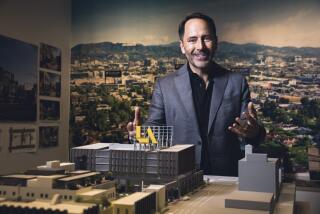Actor Hitches His Financial Stability to ‘Star Waggons’ : Film industry: The Sylmar firm started by the onetime ‘Carol Burnett Show’ regular is now a major provider of makeup and wardrobe trailers.
- Share via
Lyle Waggoner--Hollywood actor--has more of a ring to it than Lyle Waggoner--builder of makeup and wardrobe trailers for the movie industry. But for Waggoner, who spent eight years on “The Carol Burnett Show,” trading in stardust for sawdust has meant more financial stability than he ever knew in the film industry.
Waggoner’s 13-year-old business, Star Waggons in Sylmar, leases custom-made trailers and motor homes to movie studios and television production companies for location work. His company is now one of the biggest renters of mobile dressing rooms and does $3 million a year in business.
His fleet includes six motor homes or recreational vehicles, and 115 trailers that are towed by studio trucks to film sites. He purchases the motorized vehicles built to his specifications from a factory. And with 20 full-time employees at the Sylmar plant, Waggoner’s team also builds makeup, wardrobe and actors’ dressing trailers from scratch from the axles and chassis on up.
Rental fees range from $350 per week for a wardrobe trailer to transport costumes, to $1,000 per week for a three-room, actor’s dressing trailer, complete with bay window, television, microwave, makeup area, refrigerator and sofa in each room. For a television series, the equipment is leased out an average of seven to eight months, and 10 weeks to a year for a movie, he said.
His clients include Universal Studios for the television series “Murder, She Wrote” and “Columbo,” Paramount Pictures for “Star Trek, The Next Generation” and Fox for “True Colors.” His client list also includes Columbia Pictures and Warner Brothers, and production companies such as Apollo Productions, Avnet and Big Sky.
Waggoner started out leasing motor homes to movie studios in 1978 while he was still working on the “Wonder Woman” television series.
As an actor, he had sat in many a motor home, studying scripts between camera shoots. Curious about where the vehicles came from, he discovered that the transportation departments at the studios were renting motor homes from private owners, he said. There wasn’t a company that had a whole fleet of vehicles to lease.
“I saw an opening, a void, and I filled it,” he said.
Waggoner, 56, had no business background when he started, but he attributes his early success to a strong entrepreneurial spirit, having a steady TV job, his wife Sharon’s business acumen, and a federal tax credit that no longer exists.
“Sharon was a good investor and we were constantly looking for tax shelters,” he said. “We had enough for a down payment for a motor home and it sounded like a good return.”
He could buy a motor home for $35,000, lease it to a studio for $1,600 per month--$1,005 more than his monthly payment of $595 to the bank for the vehicle.
But “I wouldn’t have, and perhaps couldn’t have, started without the tax credit which was eliminated in 1986,” Waggoner said.
“If you invest in equipment to make your business grow, the government allowed a 10% tax credit off of your income tax,” he said. “You could use the money to buy more equipment. It was a total growth stimulator.”
Universal Studios was his first client. They took a chance and got him started because he promised them brand-new equipment, he said. Waggoner started with one motor home and as the studio needed more equipment, he’d go out and buy more.
The company became more than just an investment in 1979 when the “Wonder Woman” TV series was canceled. “Acting is such an unstable business that you always need to look for a backup,” Waggoner said. “Actors get secure if they have a series, but they’re not secure. If a series is canceled, you can’t just go out and get another series.”
He was forced to consider his options--auditioning and hoping for another long-running series, or throwing his energies into a growing business. He continued to act, but by 1980 he had incorporated his business and began devoting himself to it full time.
Waggoner said he was able to expand his business because he had worked in the industry and knew firsthand the needs of actors and the support personnel in makeup and wardrobe. After three years in the rental business, he began customizing his motor homes and then building trailers from scratch. He would build prototype trailers, rent them out and then bring them back for fine-tuning based on the comments that he got from the people who used them.
“Actors don’t need a four-burner stove,” Waggoner said. What they did need were lockboxes for furs, bulletin boards for work schedules, shelves with a slight lip on the edge so hats and shoes wouldn’t roll off during transit, and a waiting area in the makeup trailers for actors. “I can remember waiting for makeup and there was no place to sit down,” he said.
The industry doesn’t seem to have been hurt by the recession, he said. He expects his 1991 revenues to increase slightly over his $3 million in sales in 1990.
The number of units leased out per week continues to increase. “We used to think we were doing well at 40 units per week,” he said. “Now we’re up to 80 units per week except for the lull during the Christmas holidays.”
Star Waggons is one of the top three rental companies in the business, said Rick Finney, Universal Studio’s supervisor of transportation. “I’ve been working with Lyle for 10 years,” Finney said. “He’s got a pretty reputable business.”
Waggoner’s competition includes El Monte RV Center in El Monte and Holiday Motor Homes in Los Angeles, Finney said.
They all provide customized motor homes and trailers and Holiday has gotten into building its own trailers too, he said. Price is always a very important factor in choosing a rental company, but so are the needs of the actors, Finney said. “Lyle’s equipment is going to be more plush, more top of the line.”
Star Waggons caters to something more than needs, Waggoner said.
“Actors are funny people. There’s so much ego involved. I’ve seen contracts spelling out that the star’s trailer be two feet longer than another actor’s. One actress wanted hubcaps because somebody else had them. It’s cute, I can identify with it.”
To satisfy those needs, Waggoner has built two Super Star Waggons and outfitted them with soft leather seats, oak tables, a color television, VCR, compact disc player, microwave, refrigerator and other amenities.
He also has to be responsive to the budget needs of the studios and production companies who rent them. He has sold all but six of the 60 motor homes he owned in favor of a fleet of nearly 115, truck-drawn trailers.
The studios began asking for trailers because trailers are cheaper to operate. Previously, the driver of a motor home would have to stay with the vehicle on site during filming. Now after the trailer is unhitched, the studio can send the driver to another location.
He sends trailers to locations from Maine to Florida and Acapulco to Canada, but he doesn’t anticipate expanding his manufacturing operations to other sites, because it’s a very small market and there are not that many customers, he said.
Waggoner plans to expand his business by “continuing to build state-of-the-art equipment till I’ve got the industry saturated. We service our equipment thoroughly and we’re constantly upgrading and fine-tuning. That’s what the studios want.”
Since his days on “Wonder Woman,” he has devoted about 97% of his time to his business and the rest to acting. He still acts and has appeared on the television series “Golden Girls.”
That could change. He has two potential series in the works this year.
“I’d think about doing a series, but I’d have to think very hard. I have more free time now than if I were on a series.”
More to Read
The biggest entertainment stories
Get our big stories about Hollywood, film, television, music, arts, culture and more right in your inbox as soon as they publish.
You may occasionally receive promotional content from the Los Angeles Times.










